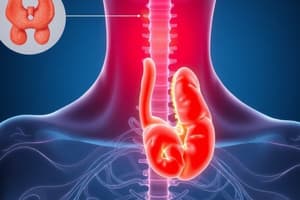Podcast
Questions and Answers
What characterizes the release of excessive amounts of stored thyroid hormone in hyperthyroidism?
What characterizes the release of excessive amounts of stored thyroid hormone in hyperthyroidism?
- It typically lasts more than 6 months.
- It results from a destructive process. (correct)
- It is due to an increase in TSH levels.
- It is caused by overproduction from the thyroid gland.
Which of the following statements about Graves' Disease is true?
Which of the following statements about Graves' Disease is true?
- It is due to a deficiency of thyroid hormone.
- It does not have a genetic predisposition.
- It involves antibodies that are under negative feedback control.
- It is the most common cause of hyperthyroidism. (correct)
What is a specific physical exam finding associated with Graves' Disease?
What is a specific physical exam finding associated with Graves' Disease?
- Low blood pressure.
- Uniformly enlarged thyroid gland/goiter. (correct)
- Sore throat.
- Increased body weight.
Which of the following is a complication of Graves' Disease that affects the eyes?
Which of the following is a complication of Graves' Disease that affects the eyes?
How do antibodies in Graves' Disease affect the thyroid gland?
How do antibodies in Graves' Disease affect the thyroid gland?
Which symptom is associated with hyperthyroidism?
Which symptom is associated with hyperthyroidism?
What mechanism do thionamides use to manage hyperthyroidism?
What mechanism do thionamides use to manage hyperthyroidism?
Which of the following is NOT a common symptom of hypothyroidism?
Which of the following is NOT a common symptom of hypothyroidism?
How does estrogen affect thyroid function tests?
How does estrogen affect thyroid function tests?
Which of the following conditions is most likely to lead to hypothyroidism?
Which of the following conditions is most likely to lead to hypothyroidism?
What changes occur to thyroid hormone supplementation requirements during pregnancy for hypothyroid women?
What changes occur to thyroid hormone supplementation requirements during pregnancy for hypothyroid women?
Which symptom indicates a state of hyperthyroidism?
Which symptom indicates a state of hyperthyroidism?
What is the primary difference between hyperthyroidism and thyrotoxicosis?
What is the primary difference between hyperthyroidism and thyrotoxicosis?
Which symptom is NOT commonly associated with hyperthyroidism?
Which symptom is NOT commonly associated with hyperthyroidism?
What condition is characterized by life-threatening thyrotoxicosis?
What condition is characterized by life-threatening thyrotoxicosis?
What body sign may indicate a thyroid issue during an examination?
What body sign may indicate a thyroid issue during an examination?
What is a potential cause for thyroid storm?
What is a potential cause for thyroid storm?
Which classification describes hyperthyroidism originating from the thyroid gland itself?
Which classification describes hyperthyroidism originating from the thyroid gland itself?
What can increase the risk of thyroid storm in a patient with known thyrotoxicosis?
What can increase the risk of thyroid storm in a patient with known thyrotoxicosis?
Which of the following would NOT be a sign of thyroid storm?
Which of the following would NOT be a sign of thyroid storm?
What is the primary hormonal factor involved in secondary hyperthyroidism?
What is the primary hormonal factor involved in secondary hyperthyroidism?
Flashcards
Hyperthyroidism
Hyperthyroidism
A condition of too much circulating thyroid hormone in the body.
Thyrotoxicosis
Thyrotoxicosis
High circulating thyroid hormone regardless of the source.
Common Hyperthyroidism Symptoms
Common Hyperthyroidism Symptoms
Weight loss, tremors, palpitations, heat intolerance, anxiety.
Hyperthyroidism: Physical Exam Findings
Hyperthyroidism: Physical Exam Findings
Signup and view all the flashcards
Thyroid Storm
Thyroid Storm
Signup and view all the flashcards
Thyroid Storm Classification Factors
Thyroid Storm Classification Factors
Signup and view all the flashcards
Primary Hyperthyroidism
Primary Hyperthyroidism
Signup and view all the flashcards
Secondary Hyperthyroidism
Secondary Hyperthyroidism
Signup and view all the flashcards
Hyperthyroidism: Release of Stored Hormones
Hyperthyroidism: Release of Stored Hormones
Signup and view all the flashcards
Graves' Disease
Graves' Disease
Signup and view all the flashcards
Graves' Disease Mechanism
Graves' Disease Mechanism
Signup and view all the flashcards
Graves' Disease: Physical Findings
Graves' Disease: Physical Findings
Signup and view all the flashcards
Thyroid Ophthalmopathy
Thyroid Ophthalmopathy
Signup and view all the flashcards
Thyroid Ophthalmopathy incidence
Thyroid Ophthalmopathy incidence
Signup and view all the flashcards
Study Notes
Hyperthyroidism
- Hyperthyroidism is a condition of too much circulating thyroid hormone in the body
- Thyrotoxicosis refers to high circulating thyroid hormone regardless of its source
- Common symptoms include weight loss despite increased appetite, hand tremors, palpitations, heat intolerance, anxiety, frequent bowel movements, fine hair, increased thirst and urination, light and infrequent menstrual periods, difficulty sleeping, weakness in upper arms and thighs, and fatigue.
- Physical exam findings may include rapid heart rate, hand tremors, hyperreflexia, enlarged thyroid gland, moist fine skin, inability to sit still, lid lag, proptosis, and onycholysis.
- Thyroid storm is a life-threatening thyrotoxicosis, which is often the result of abrupt cessation of antithyroid drugs, surgical procedures, or exposure to iodine-containing contrast or radioactive iodine.
- There is a classification system for thyroid storm using a point scale based on body temperature, heart rate, signs of congestive heart failure, atrial fibrillation, central nervous system disturbance, and gastrointestinal-hepatic dysfunction.
Classifications for Hyperthyroidism
- According to the level of dysfunction within the H-P-T axis:
- Primary hyperthyroidism: problem at the level of the thyroid gland itself
- Secondary hyperthyroidism: problem at the level of the pituitary leading to overproduction of TSH
- Tertiary hyperthyroidism: (no known instances)
- According to the type of process leading to high levels of thyroid hormone:
- Ongoing thyroid hormone synthesis and release
- Release of excessive amounts of pre-formed, stored thyroid hormone due to a destructive process, usually short-lived less than 3 months.
Disorders causing hyperthyroidism/thyrotoxicosis
- Graves' Disease:
- Most common cause of hyperthyroidism
- Caused by antibodies that bind to and activate TSH receptors, causing thyroid gland to overproduce thyroid hormone.
- Antibodies mimic actions of TSH, but are not under negative feedback control.
- Tends to run in families with other autoimmune conditions.
- Has specific physical exam findings:
- Uniformly enlarged thyroid gland/goiter +/- thyroid bruit
- Thyroid ophthalmopathy: proptosis, stare, lid lag, redness, abnormal extraocular movements, tearing, periorbital edema.
- Occurs in nearly 70% of patients if diagnosed by CT.
- Clinically evident ophthalmopathy occurs in about 25% of patients.
Studying That Suits You
Use AI to generate personalized quizzes and flashcards to suit your learning preferences.




